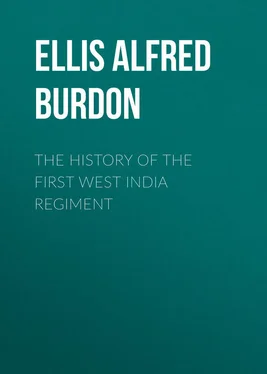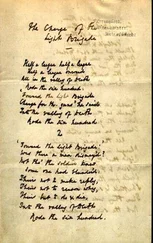Alfred Ellis - The History of the First West India Regiment
Здесь есть возможность читать онлайн «Alfred Ellis - The History of the First West India Regiment» — ознакомительный отрывок электронной книги совершенно бесплатно, а после прочтения отрывка купить полную версию. В некоторых случаях можно слушать аудио, скачать через торрент в формате fb2 и присутствует краткое содержание. Жанр: foreign_antique, foreign_prose, на английском языке. Описание произведения, (предисловие) а так же отзывы посетителей доступны на портале библиотеки ЛибКат.
- Название:The History of the First West India Regiment
- Автор:
- Жанр:
- Год:неизвестен
- ISBN:нет данных
- Рейтинг книги:3 / 5. Голосов: 1
-
Избранное:Добавить в избранное
- Отзывы:
-
Ваша оценка:
- 60
- 1
- 2
- 3
- 4
- 5
The History of the First West India Regiment: краткое содержание, описание и аннотация
Предлагаем к чтению аннотацию, описание, краткое содержание или предисловие (зависит от того, что написал сам автор книги «The History of the First West India Regiment»). Если вы не нашли необходимую информацию о книге — напишите в комментариях, мы постараемся отыскать её.
The History of the First West India Regiment — читать онлайн ознакомительный отрывок
Ниже представлен текст книги, разбитый по страницам. Система сохранения места последней прочитанной страницы, позволяет с удобством читать онлайн бесплатно книгу «The History of the First West India Regiment», без необходимости каждый раз заново искать на чём Вы остановились. Поставьте закладку, и сможете в любой момент перейти на страницу, на которой закончили чтение.
Интервал:
Закладка:
Localisation, to be effectual, must be thorough; but it and the demands of foreign service are so incompatible that they cannot be efficiently combined. At the present time, neither is said to be in a satisfactory condition, and the Reserve, which was expected to have risen to a total of 80,000 men, consists of 32,000 only.
Military reformers have long since arrived at the conclusion that if the British Army is to be maintained at such a footing as to give weight to the voice of Great Britain in the councils of Europe, we must have two distinct armies; namely, one for home service, ready for a European imbroglio, and a second to which the defence of the colonies can be entrusted. The objection to this has been, hitherto, the great expense, for it has always been taken for granted that this Colonial Army would consist of white soldiers; and the question of increased pay, supply of recruits, and periodical removal of men to the United Kingdom, over and above the cost of the Territorial Army, had to be considered. With negro troops, however, for the Colonial Army, this objection, if it does not entirely disappear, is reduced at least by three-quarters. Should it be tried on a small scale and found successful, there need be no reason why in time almost the whole of the Territorial battalions should not be withdrawn from foreign service. In this way localisation could be made a reality; and with such vast untouched recruiting grounds as our colonies offer, there can be no doubt as to the practicability of raising the negro regiments required. Such regiments might also partly compose the garrisons of Gibraltar, Malta, Cyprus, Aden, and Ceylon. There is, indeed, no reason, except the hatred of the Hindoo for the negro, why such regiments might not serve in India. As the negro would never coalesce with the natives of India, a new and entirely reliable force, indifferent to tropical heat, and not requiring a vast retinue of camp-followers, would be always at hand. Of course, negro battalions could never be employed in cold latitudes, for the negro suffers from cold in a manner which is incomprehensible even to Europeans who have passed the best part of their lives in the tropics. Instead of being braced by and deriving activity from the cold, he becomes languid and inert; and nothing but the rays of the sun can arouse him to any exertion. Even in West Africa, during the Harmattan season, natives may be observed in the early morning, hugging their scanty clothing around them and shivering with cold; while the ill-fated expedition to New Orleans showed what deadly havoc an inclement climate will play with negro troops.
Next, as to the men of whom these negro regiments would be composed. It is too much the custom in Great Britain, in describing a man of colour, to consider that all has been said that is necessary when he is called a negro; yet there are as many nationalities, and as many types of the African race, as there are of the Caucasian. No one would imagine that a European was sufficiently described by the title of "white man." It would be asked if the individual in question were an Englishman, German, Frenchman, and so on; and the same kind of classification is necessary for the negro. On the western coast of Africa, the portion of the African continent from which North and South America and the West Indies obtained their negro population, there are at least twenty different varieties of the African race, distinct from each other in features and even in colour; and these are again subdivided into several hundred nations or tribes, each of which possesses a language, manners, and customs of its own.
In the days of the slave-trade, the slave-dealers adopted certain arbitrary designations to denote from what portion of the coast their wares were obtained. For instance, slaves shipped from Sierra Leone and the rivers to the north and east of that peninsula, and who were principally Timmanees, Kossus, Acoos, Mendis, Foulahs, and Jolloffs, were called Mandingoes, from the dominant tribe of that name which supplied the slave-market. Negroes from the Gold Coast kingdoms of Ashanti, Fanti, Assin, Akim, Wassaw, Aquapim, Ahanta, and Accra were denominated Koromantyns, or Coromantees, a corruption of Cormantine, the name of a fort some sixteen miles to the east of Cape Coast Castle, and which was the earliest British slave-station on the Gold Coast. Similarly, slaves from the tribes inhabiting the Slave Coast, that is to say, Awoonahs, Agbosomehs, Flohows, Popos, Dahomans, Egbas, and Yorubas, were all termed Papaws; while those from the numerous petty states of the Niger delta, where the lowest type of the negro is to be found, were known as Eboes.
Thousands of men of these tribes, and others too numerous to mention, were carried across the Atlantic and scattered at hap-hazard all over the West India Islands. At first tribal distinctions were maintained, but in the course of years, in each island they gradually disappeared and were forgotten; until at the present day a West India negro does not describe himself as a Kossu or a Koromantyn, but as a Jamaican, a Barbadian, an Antiguan, etc. It would naturally be supposed that as the West India Islands all received their slave population in the same manner, and that as in each there was the same original diversity of nationalities, subsequently blended together by intermarriages and community of wants and language, a West India negro of the present generation from any one island would be hardly distinguishable from one from any other. Nothing, however, would be further from the truth. Since the abolition of slavery, the conditions of life in the various islands have been so different – in some the dense population necessitating daily labour for an existence, while in others large uncultivated stretches of wood and mountain have afforded squatting grounds for the majority of the black population – that, in conjunction with diversity of climate, each group of islands is now populated with a race of negroes morally distinct per se . The difference between a negro born and bred in Barbados and one born and bred in Jamaica is as great as between an American and an Englishman, and the clannish spirit of the negro tends to increase that difference. At the present time the negro of Jamaica does not care to enlist in the 2nd West India Regiment, which is largely recruited in Barbados; and, in the same way, the Barbadian declines to serve in the 1st West India Regiment, because it is almost entirely composed of Jamaicans.
While the negroes of the West Indies have thus lost all their tribal peculiarities in the natural course of progress and civilisation, those of West Africa have remained at a standstill; and there is to-day as much difference between the hideous and debased Eboe and the stately and dignified Mandingo, between the docile Fanti and the bloodthirsty Ashanti, as there was one hundred and fifty years ago. Civilising influences have made this contrast between the Africans and their West India descendants still more striking. The latter have, since the abolition of slavery, been living independent lives, in close contact with civilisation, and enjoying all the rights of manhood under British laws. From their earliest infancy they have known no language but the English, and no religion but Christianity; while the former are still barbarians, grovelling in fetishism, cursed with slavery, ignorant, debased, and wantonly cruel. The West India negro has so much contempt for his African cousin, that he invariably speaks of him by the ignominious title of "bushman." In fact, the former considers himself in every respect an Englishman, and the anecdote of the West India negro, who, being rather roughly jolted by a Frenchman on board a mail steamer, turned round to him and ejaculated, "I think you forget that we beat you at Waterloo," is no exaggeration.
Just as the negro races of West Africa are distinct from one another, and the West India negro from all, so are the coloured inhabitants of both those parts of the world entirely distinct from the Kaffir tribes of South Africa; and a coalition between Galeka or Zulu inhabitants and West India troops would be as impossible as the fraternisation of a Territorial battalion with the natives of India. Apart, however, from the fact that negro troops could always be safely employed alone outside the colony in which they were bred, history has shown that the fidelity of West India soldiers is beyond question. Indeed it would be difficult to say what stronger ties there could be than those of sentiment, language, and religion, and the association from childhood with British manners, customs, laws, and modes of thought. When to these are added discipline, the habit of obedience, and that well-known affection for their officers and their regiment which is so particularly an attribute of the West India soldier, it must be acknowledged that the guarantees of fidelity are, with the single exception of race, at least as good as those of the linesmen.
Читать дальшеИнтервал:
Закладка:
Похожие книги на «The History of the First West India Regiment»
Представляем Вашему вниманию похожие книги на «The History of the First West India Regiment» списком для выбора. Мы отобрали схожую по названию и смыслу литературу в надежде предоставить читателям больше вариантов отыскать новые, интересные, ещё непрочитанные произведения.
Обсуждение, отзывы о книге «The History of the First West India Regiment» и просто собственные мнения читателей. Оставьте ваши комментарии, напишите, что Вы думаете о произведении, его смысле или главных героях. Укажите что конкретно понравилось, а что нет, и почему Вы так считаете.












